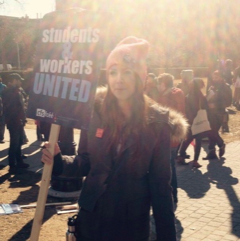
Lydia Dobson
Law students wear many hats, and at Osgoode, many students also wear the hat of being community organizers. I had the honour of interviewing 12 JD students about their involvement in various social justice movements and community initiatives this past year. Here is an overview of their work.
Lydia Dobson (2L) is a dedicated social activist who has for many years been involved in workers’ rights movements and organizing. She is currently a student at Parkdale Community Legal Services (PCLS) in the Workers’ Rights Division.
Lydia highlighted one of the aspects of PCLS that she values: “we try to centre our work around what clients want. We listen to the community and are always mindful of larger organizing goals. … [W]e can conduct debtors’ actions examinations and appear at contempt of court hearings, but we can also organize an action outside the person’s workplace. At PCLS, we’re given the option and are encouraged to take non-legal avenues that, I find, are a lot more empowering for the people we’re working with. We wouldn’t have the space to do that without the partnership we have with the Workers’ Action Centre.”
In terms of what drew her to labour movement work, Lydia reflected on her own experiences during high school and university: “I worked a ton of minimum wage, precarious jobs. I saw firsthand and experienced the ways that people are exploited and devalued by employers.”
For example, Lydia explained, “Restaurants are divided along so many overt levels that are problematic. Oftentimes, racialized people work in the kitchen; people who work in front as servers are white; in the fine dining section, the servers are often distinguished-looking men. I saw how people’s identities – their race, gender, sexual orientation, immigration status, etc. – would dramatically impact how they’re treated by employers and the ways that they are vulnerable to exploitation. Taking that firsthand experience and applying it is what made me interested in doing this kind of work.”
She explained what community organizing means to her: “you have to be involved with and be listening to and taking instruction for the community you’re supporting. Oftentimes, the law doesn’t do that, and lawyers don’t see themselves as having the capacity to do that. In law school, it’s a space where you can get further and further removed from the people you want to support, which is dangerous. I try and do a lot of things to keep me grounded in terms of why I’m here.”
Since 2014, Lydia has been involved in the $15 and Fairness campaign, in both Ottawa and Toronto. She said, “We just had a provincial organizing meeting a few weekends ago which brought together people from all over Ontario (different unions, supportive groups, workers’ action centres) to discuss the goals of the campaign. The campaign is not just for minimum wages, but also decent working conditions and fairness in the workplace.”
Lydia commented on the impacts that Covid-19 has had. “[The crisis] is making it undebatable that we need a better social safety net.” She pointed out stark wealth disparities in society, where while some people are in mansions and living in luxury, other people are now facing eviction notices as an implication of losing their jobs. “People should have enough money from working a full-time job that they don’t have to worry about putting food on the table.”
In light of the coronavirus pandemic, Lydia issued the following call to action: “if you know someone doing frontline service work, check in with them and make sure they’re ok. She also stressed the importance of putting pressure on governments to change policies that would alleviate the resounding negative impacts of wage losses for workers, their families, and communities. She encourages people to sign a petition for ‘HELP: Health Emergency Labour Protections,’ available on 15andfairness.org.
